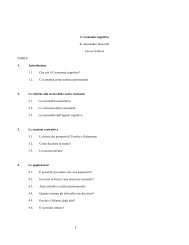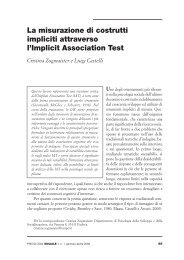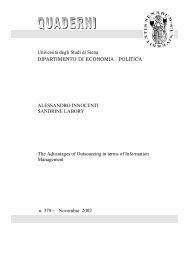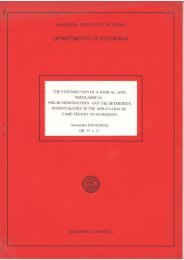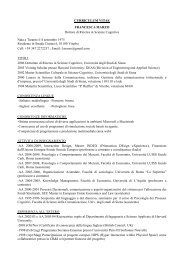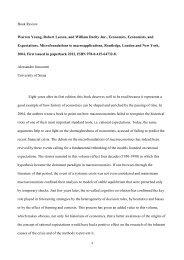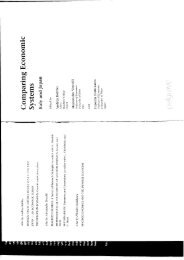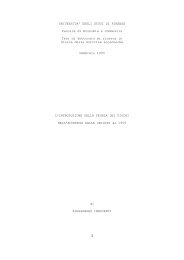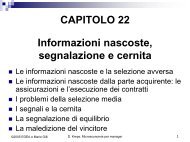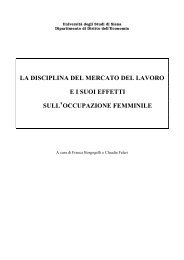Abstracts Book - LabSi
Abstracts Book - LabSi
Abstracts Book - LabSi
You also want an ePaper? Increase the reach of your titles
YUMPU automatically turns print PDFs into web optimized ePapers that Google loves.
Vittorio Pelligra (Università di Cagliari)<br />
“How to distinguish between trust and reciprocity”<br />
The two concepts of trust and reciprocity are tightly intertwined. In most theoretical and<br />
experimental studies trust is considered as an expectation of reciprocal behaviour. Under deeper<br />
scrutiny, however, the relation between the two concepts turns out to be richer and more complex<br />
than that. In a recent study Cox (2004) tries to experimentally distinguish the motivating effect of<br />
distributional concerns, on the one hand, and fiduciary and reciprocal factors, on the other, in<br />
bargaining games. He claims that: “Decomposing trust from altruism and reciprocity from altruism<br />
or inequality aversion is critical to obtaining empirical information that can guide the process of<br />
constructing models that can increase the empirical validity of game theory” (p.260). Cox’s design,<br />
however, leaves unexplored yet another important distinction, that between trust and reciprocity. In<br />
this paper I argue that trust cannot be considered only as an expectation of reciprocity, since there<br />
are classes of trusting interactions where trustworthiness does not lead to mutual gain and therefore<br />
cannot be explained in term of reciprocity. That implies that trust and reciprocity should be kept<br />
conceptually separated. The paper provides theoretical and empirical foundations to this distinction<br />
I present both a conceptual qualification of the relation between trust and reciprocity and the results<br />
of an experiment designed to discriminate between trust as an expectation of reciprocity and trust as<br />
an expectation of trustworthiness.<br />
Alessandro Innocenti* and Maria Grazia Pazienza** (*Università di Siena, **Università di Firenze)<br />
“Altruism and Gender in the Trust Game”<br />
This paper analyses gender differences in the trust game. Our experiment implements the triadic<br />
design proposed by Cox (2004) to discriminate between transfers resulting from trust or<br />
trustworthiness and transfers resulting from altruistic preferences. We observe that women exhibit a<br />
higher degree of altruism than men for both trust and trustworthiness but relatively more for<br />
trustworthiness. This result provides an explanation to the experimental finding that women<br />
reciprocate more than men.<br />
SESSION B2 – SOCIAL PREFERENCES AND PUBLIC GOODS<br />
Dirk Engelmann* and Veronika Grimm** (*Royal Holloway, University of London, **University<br />
of Cologne)<br />
“Overcoming Incentive Constraints? The (In)-effectiveness of Social Interaction”<br />
We experimentally study behavior in a simple voting game where players have private information<br />
about their preferences. With random matching, subjects overwhelmingly follow the dominant<br />
strategy to exaggerate their preferences. Applying the linking mechanism suggested by Jackson and<br />
Sonnenschein (2005) captures nearly all achievable efficiency gains. Repeated interaction leads to<br />
significant gains in truthful representation and efficiency only if players can choose their partners.<br />
14



